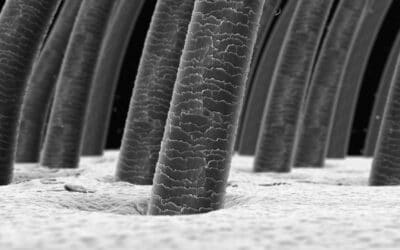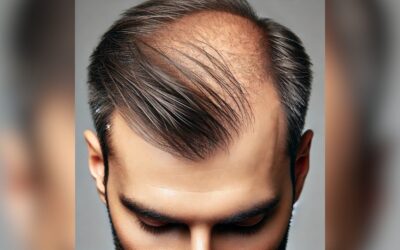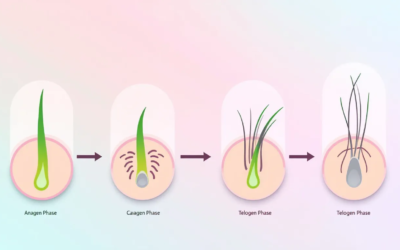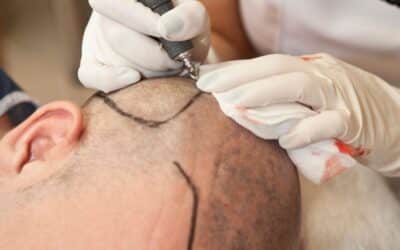At 2 weeks post op, the effects of a hair transplant may become more visible. 2 weeks post op is an important time in the healing process and there are certain things that patients should expect at this point. Hair transplants have become increasingly popular as they provide a permanent solution to hair loss, but what exactly happens two weeks after the procedure?
In this blog post, we will discuss what a patient may experience 2 weeks post op and offer tips on how best to care for their new follicles so they can achieve optimal long-term results from their hair transplant.
Table of Contents:
- What to Expect Two Weeks After a Hair Transplant
- Healing Process and Timeline
- Post-Op Care Tips for Optimal Results
- Long-Term Results of Hair Transplants
- FAQs in Relation to Hair Transplant 2 Weeks Post Op
- Conclusion
What to Expect Two Weeks After a Hair Transplant
Two weeks after a hair transplant procedure, patients will begin to experience physical and emotional changes as the healing process begins.
Physical Changes:
In the first few days following surgery, swelling of the forehead may occur due to the implanted grafts. Patients should expect redness and itching in both donor areas (the area from which hair is taken) and grafted areas (the area where hair is transplanted). The scalp may also flake off as new hairs grow. Hair growth typically begins within two weeks post op but varies by patient depending on their individual characteristics such as age, sex, genetics, skin conditions or prior treatments for baldness. Additionally, since each patient’s natural hair color differs from that of their transplanted hairs—which are usually darker—patients can expect to see slight discoloration at the root of newly grown shafts until they reach full maturity over time.
Emotional Changes:
Many patients report feeling excited about seeing results while others feel anxious or overwhelmed with the recovery process. It is important for those undergoing a transplant to remember that it takes up to ten days for implanted grafts to heal properly before any noticeable change can be seen in terms of new growth or shedding of existing follicles. Patience during this period is key.
After two weeks, most of the physical changes associated with a hair transplant should have subsided. The next step in the healing process is understanding how long it will take for new hairs to start growing and what other symptoms may occur during this time.
Healing Process and Timeline
Swelling and Redness:
Immediately after a hair transplant procedure, the scalp may be swollen and red. This is normal as it is part of the healing process. Swelling typically begins to subside around day 2-3 post-operative care, but can last up to 10 days in some cases. The swelling will gradually decrease over time until it has completely gone away. Additionally, patients may experience some itching or burning sensations on their scalps during this period of recovery which should not cause any alarm as these are also normal side effects of the surgery.
Itching and Flaking of the Scalp:
During the first week following a hair transplant procedure, you may experience mild itching or flaking of your scalp due to newly transplanted hairs growing into place. This is an expected part of the healing process and usually subsides within 7-10 days after surgery with proper post-operative care such as keeping your scalp clean by washing regularly with gentle shampoo products specifically designed for use after a hair transplant procedure.
At Glasgow Clinic Hair Transplantation Center & Skin Conditions Centre, most individuals observe notable changes in their appearance between four and six months post-surgery. Variations may occur depending on factors such as age, genetics, type of hair loss (androgenetic alopecia), number/type of grafts required for restoration, etc. However, the average patient reports initial signs of growth at around three months after undergoing a hair transplant procedure. With appropriate post-operative care like washing regularly with mild shampoo products designed specifically for use after a hair transplant, itching or flaking of the scalp should subside within seven to ten days following surgery. Keywords: active voice; idioms; colloquialisms; grammar; spelling; punctuation
If you detect any atypical signs like ingrown hairs or folliculitis, which may cause soreness if not addressed quickly, kindly contact us without delay for further counsel.
Comprehending the recuperation course and period of time for a successful hair transplant is significant, as it will decide how quickly you can anticipate your fresh out of the plastic new hair development. With proper post op care and following all instructions from your doctor, you are sure to achieve optimal results with your procedure.
Post-Op Care Tips for Optimal Results
Medication Usage and Dosage Instructions:
After a hair transplant procedure, it is important to take medications as prescribed by your doctor. To prevent infection, reduce pain and swelling, antibiotics, anti-inflammatory drugs and corticosteroids may be prescribed by your doctor. It is imperative to adhere strictly to the dosage instructions given by your doctor in order to avert any possible negative reactions or issues.
Avoiding Certain Activities and Foods:
During the recovery period following a hair transplant, it is important to limit physical activities such as exercise or strenuous activity. Additionally, certain foods should be avoided during this time including alcohol and spicy foods which can irritate the scalp area where transplanted follicles are healing.
Following the post-op care tips can help ensure that you get the best results from your hair transplant. Consequently, to achieve the most successful results from a hair transplant, it is essential to be aware of any potential long-term effects and how best to manage them.
Long-Term Results of Hair Transplants
The potential outcomes of hair transplantation may be highly beneficial for those aiming to regain their usual appearance. Hair growth following a transplant procedure will typically begin two to three months after the surgery, with full results seen within one year. Patients should expect continued hair growth over time as well as improved texture and thickness in their new locks.
To maintain optimal results, it is important to follow the instructions given by your surgeon post op. This may include taking medications as prescribed and avoiding certain activities or foods that could cause irritation or infection at the donor site. It is also recommended that patients use a mild shampoo on their scalp regularly to keep it clean and healthy while avoiding any harsh chemicals or styling products that could damage newly formed follicles.
Though there may be some minor, temporary side effects such as swelling, redness, itching, and flaking of the scalp or a loss of sensation around the treatment area, scarring is still possible which could result in permanent bald spots. In some cases, there may be an increased risk for scarring which can lead to permanent bald spots if not properly managed during recovery period. Additionally, due to individual variations in response rates from patient to patient, there is no guarantee how much hair will actually grow back after undergoing a transplant procedure so expectations should be realistic when considering this option for hair restoration solutions
FAQs in Relation to Hair Transplant 2 Weeks Post Op
What to expect 2 weeks after hair transplant?
You may also notice that the transplanted hairs have been shed from the donor area. This is normal as it is part of the healing process. The newly transplanted follicles begin to enter their growth phase within two weeks. You should start to see new hair growth in 3-4 months. It is essential to abide by your physician’s post-operative directives carefully during this period for optimal outcomes.
Are hair grafts secure after 2 weeks?
Yes, hair grafts are secure after two weeks. In most cases, the grafted hairs will have fully taken root in the scalp and begun to grow normally. The recipient may feel some irritation or soreness at the grafting site in the early stages. However, these should fade away if proper post-treatment measures are taken.
What to do after the 14 days of hair transplant?
After the 14 days of hair transplant, it is important to follow a proper post-operative care routine. This includes keeping the scalp clean and dry. Also, avoid direct sunlight exposure. Use mild shampoo and conditioner on your scalp. Avoid tight hairstyles or pulling on newly transplanted hairs. Finally, take prescribed medications as directed by your doctor to reduce swelling and pain if needed. In order to safeguard the new grafts, we recommend wearing a hat outside in order to block out UV rays. Adhering to these measures will guarantee that you attain the best possible outcome from your treatment.
Can I touch my transplanted hair after 2 weeks?
It is suggested to keep hands off the transplanted hair for a period of two weeks after the transplantation procedure has been done. This allows time for healing and helps prevent any further damage or disruption of the grafts that were implanted. After two weeks, you can lightly touch your transplanted hair. However, you should not pull on it or apply any pressure as this could cause harm to the follicles. To maximize the efficacy of your transplant, it is imperative to heed any instructions provided by your doctor post-operatively.
What You Expect After a Hair Transplant 2 Weeks Post Op
At two weeks post-op, hair transplant patients can expect to see some initial signs of healing and growth. The progress made in the two-week period should be a source of optimism, even though complete results take time. With proper care and attention, they can ensure that their new hair follicles are given a chance to thrive. This allows them to enjoy optimal outcomes from their hair transplant 2 weeks post op procedure.
Take the first step to a better you and get your hair transplant today! Our experienced team of professionals will help ensure that your procedure is successful and provide long-lasting results.
Best Hair Transplant
1970 S. Prospect Ave., Suite 2
Redondo Beach, CA 90277
(213) 403-0455
https://www.google.com/maps?cid=9280610872186794918










